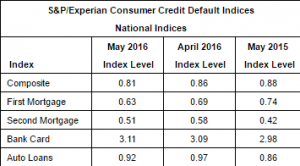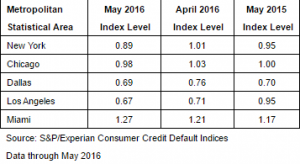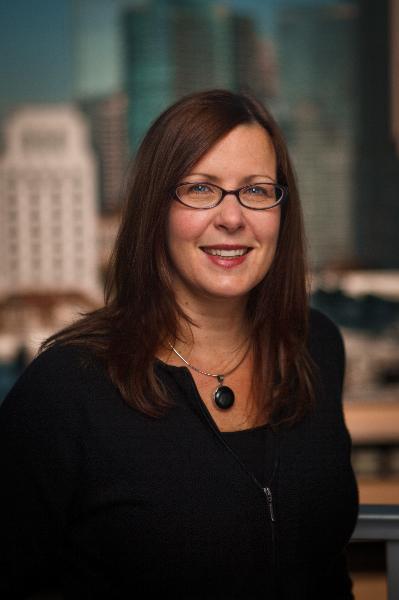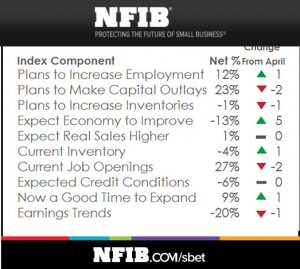Articles by Srividya Kalyanaraman
Consumer Credit Defaults Are Falling, But Don’t Celebrate Yet
June 21, 2016Waiting for some good news? Here’s half an attempt.
The S&P Dow Jones and Experian Consumer Credit Default Indices, which measures consumer default rates fell to 0.81 percent in May, down five basis points from April. The index measures comprehensive changes in consumer default rates — broken down into mortgage, auto loans and bank cards.
While this is some respite, all but bank card defaults fell in May. The bank card default rate however increased two basis points in May to 3.11 percent
The bank card default rate however increased two basis points in May to 3.11 percent
Among the cities that contributed the most, New York led with a 12 basis points drop to a default rate of 0.89 percent, followed by Dallas where rates fell by seven basis points to 0.69 percent. Chicago’s default rate fell by five basis points to 0.98 percent and Los Angeles came in fourth recording a default rate of 0.67 percent, down four basis points. Conversely, Miami’s default rates edged up higher ( six basis points) for the third consecutive month at 1.27 percent. 
“Overall the consumers’ credit picture is very good,” says David M. Blitzer, managing director and chairman of the Index Committee at S&P Dow Jones Indices. “Consumer credit default rates continue at the lowest levels in more than 10 years and well below those seen before the financial crisis.”
Is this silence before a storm?
Starting an ISO Shop? Here’s What You Need to do Differently
June 17, 2016 It’s not news that commercial finance brokers are hurting and some are even calling it quits. The industry that didn’t ask for more than a phone and a sharp sales acumen from anyone wanting to start an ISO shop is now stifled with competition. The low barriers to entry that welcomed new companies is causing a seismic shift in the way brokers do business. While some are ready to leave, most are still grappling with the changing times.
It’s not news that commercial finance brokers are hurting and some are even calling it quits. The industry that didn’t ask for more than a phone and a sharp sales acumen from anyone wanting to start an ISO shop is now stifled with competition. The low barriers to entry that welcomed new companies is causing a seismic shift in the way brokers do business. While some are ready to leave, most are still grappling with the changing times.
What’s different about the business now? Almost everything, some say. Gil Zapata who runs a four year old ISO shop, Lendinero, says clients were desperate for money when he started. However he doesn’t think of the competition as fierce but just messy. “There are brokers and ISOs entering and clogging up the system,” he said, “They are obviously fly-by-night and get pulled into it thinking the industry is a fast money maker but it’s really not.”
Competition did what competition does, drove prices and commissions down, costs up and hacked the product. For instance, daily payment ACH loans strongly tied to historical cash flow history didn’t exist. Neither did fancy verbiage for them. The onslaught of online lenders that entered the industry didn’t help either.
OnDeck started selling term loans, which had some similarities to other daily payment products, said Chad Otar, founder of New York-based MCA company Excel Capital Management. “ISOs, on their part have to be careful while pitching these products to clients, explain the contract clearly to avoid penalty.”
The competition has also led to loan stacking, much to brokers’ and lenders’ contempt. And the online lending ilk of Lending Club, Prosper and OnDeck cannot escape it either. Last week, (June 10th), Reuters ran an article calling stacking the latest threat to online lenders where “soft credit inquiries” and “patchy reporting” results in multiple lenders making loans to the same borrower, diminishing the ability to pay.
“Deals become impossible to structure and it becomes difficult for lenders to keep clients on the books when there are second and third names,” said Zapata. The proliferation of loan products that succeeded as a result of competition was a double edged sword. While there are more products to be sold, there are not enough borrowers to lend to.
From a funder’s perspective, that means acquiring and retaining a customer on price rather than an ongoing relationship. “The increased competition has led to commoditization of the MCA,” said Sol Lax, CEO of New York-based business funder Pearl Capital. “It was an exotic financial instrument 5 years ago and the ability to set up shop was restricted. That has changed.”
The ISOs are increasingly reliant on renewals, thanks to the high marketing costs. “A real differentiating factor is whether an ISO syndicates, their default rate, and their renewal rate. All of it is intertwined so that ISOs need to view their business more like investors and less like brokers,” Lax said.
So what would ISOs have done differently? Otar says he would have started an industry coalition similar to the Innovative Lending Platform Association. “I would have tried to pull a Godfather and formed a coalition with other companies and self regulate.”
For Zapata, doing things differently would have meant finding an early backer. “If I had to do this over, I’d have a good investor behind my back,” he said. “Find someone who knows the business and have a good game plan. If you don’t have deep pockets, your chances are minimal.”
BRIEF: OnDeck Expands in Denver, Invests $5 million in Office Space
June 16, 2016
OnDeck is expanding its Denver hub.
The online lender inaugurated a new office space worth $5 million, that can accommodate 550 people as it plans to add more to its existing staff there of 170. This is OnDeck’s second biggest hub after New York where it employs 300 people.
The state of Colorado and the Denver Office of Economic Development each gave the company $500,000 in 2012. And in August 2015, OnDeck won an additional $10.4 million in job growth incentive tax credits for creating an additional 400 jobs.
“Our goal is to steadily grow the office and invest more in Denver,” said Noah Breslow, the company’s CEO was quoted as saying in the Denver Post. “Denver is a natural fit for OnDeck.”
States like Colorado and New Jersey are wooing new fintech companies to build and expand their bases in the region. Thanks to the Grow New Jersey Assistance Program, merchant cash advance companies including World Business Lenders and Yellowstone Capital relocated from New York City over across the Hudson to Jersey City in exchange for tax credits. Yellowstone, for instance will earn $3.3 million over ten years in tax credits.
BRIEF: Legend Funding Secures $3 million Debt Facility
June 14, 2016New York City-based merchant cash advance company Legend Funding secured a $3 million debt facility from Houston-based investment investment banking firm Ango Worldwide.
Legend provides working capital financing to businesses in the USA and Canada and the company plans to use the funds for expansion. The deal gets Ango some equity and a seat on the board.
“The merchant cash advance industry is experiencing exciting growth and we felt that the legend management team are strongly positioned to take advance of this opportunity,” said Ango CEO John Carson in a news release.
Small Biz Feel Better About Economy But Still Won’t Borrow
June 14, 2016The nation’s small businesses are cautiously optimistic about the economy and the National Federation of Independent Business’s Index of Business Optimism testified showing a marginal rise in May.
While merchants are still nervous about sales and remain hesitant to make big capital expenditures or stock inventory, they are still looking to expand, hire more and generally expect the economy to improve.
But much to lenders’ displeasure, 31 percent reported that their credit needs were met and 52 percent said they didn’t plan on getting a loan as businesses controlled spending on capital goods. The percent of owners planning to spend on capital fell 2 points to 23 percent and the average rate paid on short term maturity loans fell by 40 basis points to 5.3 percent.
The index survey that 700 business owners participated in, rose a negligible 0.2 points to the previous reading of 93.8 last month.
While 56 percent of the respondents said they were planning to ramp up hiring, 48 percent reported a talent crunch for the positions they were trying to fill. Thirteen percent of owners cited the difficulty of finding qualified workers as their most important business problem.
Weak sales were also among the top concerns for small businesses in the country for 14 percent of the respondents, which hurt inventory and capital expenditure. The number of owners wanting to stock up on inventory was low. “These weak inventory investment readings are consistent with the rather poor performance of consumer spending in the first quarter, leaving owners with excessive stocks and no incentive to add to them,” the report said.
As Its Peer Winds Down, Able Lending Commits $5 million to Dallas Companies
June 13, 2016Small business lender Able Lending will pump in $5 million to fund companies in the Dallas-Forth Worth area in the wake of its peer running out of business.
Able calls itself “lowest cost non-bank lender” to small businesses and lends up to $1 million to businesses at any stage. Able offers better rates to entrepreneurs who raise funds from Backers – or family, friends and “fans” who fund as much as 10 percent of most Able loans. The company claims that its borrowers save $31,000 on loans between $25,000 and $1 million.
“DFW is an important market for Able. Our $5 million-dollar commitment to DFW solidifies that Able is ready to fund more deserving small businesses,” said Evan Baehr, president and cofounder of Able which began in Dallas last year to fund nearly $2 million to companies in the area.
Last week (June 5th), personal lender Vouch Financial which follows a similar family-and-friend strategy announced that it was shutting down. The three year old firm based out of San Francisco made personal loans based on what it called a ‘vouching network’ or sponsors, which secures the loan.
The Wall Street Journal reported that Vouch’s investors decided to stop backing the firm as demand for loans retreated as it struggled to compete with bigger rivals.
Shanda Group Now Owns 15% of Lending Club
June 8, 2016 It’s time for that update in the Lending Club saga.
It’s time for that update in the Lending Club saga.
After exiled CEO Renaud Laplanche sold 1.2 million shares worth $5.3 million, in the company he founded, Chinese billionaire Tianqiao Chen raised his stake in the company to 15 percent from 11 percent.
Chen’s company Shanda Group had upped its stake to 11 percent last month, making it the lender’s largest shareholder without an active management role.
Last week (June 8th) Renaud Laplanche was said to be in talks with banks and hedge funds to take the company private while the beleaguered lender was in negotiations with three hedge funds – Och-Ziff Capital Management, Soros Fund Management and Third Point to fund potentially $5 billion in loans and earn rights to own equity.
Prior to that, the San Francisco-based company had postponed its annual shareholder meeting from June 7th to June 28th and raised interest rates by 55 basis points while reducing the debt to income criteria by 12 percent.
“Given the developments of the last few weeks, the company is not yet in a position to provide its stockholders a complete report on the state of the company,” the company wrote in a SEC filing.
Below is a timeline of what 2016 has been like for Lending Club.
May
On May 9th, CEO Renaud Laplanche resigned after the board found that the company had sold an investor loans worth $22 million which violated terms given by the investor.
Three days later, on May 12th, a consortium of 200 community bank suspended their purchases of Lending Club loans.
On May 17th, Lending Club was subpoenaed by the Justice Department.
On May 23rd, the company revealed that a group led by Chinese billionaire Chen Tianqiao had upped its stake in Lending Club to 11.7%, giving it significant influence in the company.
On May 24th, the US Solicitor General published a legal brief that argued that the US Court of Appeals for the Second Circuit erred in its ruling on Madden v Midland, reducing the odds that the US Supreme Court will hear the case, and diminishing the potential negative impact that the ruling could have on Lending Club’s business model.
On May 25th, the WSJ reported that a fund Lending Club controls had strayed from its intended parameters and bought riskier loans than it had intended.
April
Ironically, in April, Lending Club along with Funding Circle and Prosper had joined forces to create a collaborative non-profit body, i.e. a trade association to promote transparency in lending.
In a SEC filing on Thursday (April 21), Lending Club notified the bureau that it will increase interest rates by 23 basis points in grades D-G and also updated its loss projections.
Later that month, the firm was in talks with Goldman Sachs and Jefferies Group to put together its first big bond offering backed by unsecured loans.
March
Lending Club filed its revised Loan Receivables and Sale Agreement and Marketing Agreement with WebBank as part of its 8-K filing on March 2nd. This revision was made to give WebBank more of a stake in the risk of each loan.
On March 8th, in an interview with Bloomberg, Renaud Laplanche said that he sees no credit deterioration and justified the rate hikes done in February as a means to cover losses should the economy slow down.
On March 22nd, the lender said that it was shifting its focus back to retail investors and invest in technology to serve them better, going back to its marketplace roots and reducing its dependence on Wall Street hedge funds and banks.
February
In February, perhaps taking cues from the Madden vs Midland case, Lending Club announced that it had changed its fee model with WebBank and also raised rates it charged to borrowers.
Completing a year since IPO, the company swung to a profit of $4.6 million, its second quarterly profit.
Earlier in February, JP Morgan acquired Lending Club loans worth $1 billion for a premium, in which borrowers had a 700 FICO score on average. This was a month after Santander sold Lending Club loans worth $1 billion in January.
Transparent Pricing Creates a Level Playing Field, says Kabbage’s Kathryn Petralia
June 7, 2016 Loan matchmaking site Lending Tree has joined the Innovative Lending Platform Association (ILPA) to participate in developing a universal small business lending disclosure system to raise transparency with lenders. It will work closely with the association over a 90-day “national engagement period” to create and implement the SMART Box (Straightforward Metrics Around Rate and Total Cost).
Loan matchmaking site Lending Tree has joined the Innovative Lending Platform Association (ILPA) to participate in developing a universal small business lending disclosure system to raise transparency with lenders. It will work closely with the association over a 90-day “national engagement period” to create and implement the SMART Box (Straightforward Metrics Around Rate and Total Cost).
deBanked spoke to Kathryn Petralia, cofounder of Kabbage Loans, which is spearheading the association with OnDeck and CAN Capital. Below are the edited excerpts from the interview:
Tell us about how the ILPA came about?
We (OnDeck, CAN Capital and Kabbage) represent the largest non bank lenders. We have collectively lent $12 billion through the course of our businesses and so we thought it will be great for us to make a statement through ILPA. We came from a perspective that there are a lot of different products for small businesses on the market like merchant cash advance, equipment financing, invoice factoring and lines of credit. All of these serve different needs and are ambiguously priced. So we wanted to find some methodology which is transparent to borrowers so they can know the exact price and total cost of borrowing.
We want to keep it open and hope that everyone participates in the disclosure methodology so borrowers can have a clear understanding of the fees they are paying.
What is SMART Box. How does it work?
Different loan products have different fees — some have maintenance fees, some have broker fees, usage fees and so on and they are all structured very differently. It can get very confusing and so we came up with all the products to understand what disclosures would be necessary to know the total cost of borrowing. We’re working with OnDeck and CAN Capital to gather comments and disclose a series of methodologies that will create the ‘Straightforward Metrics Around Rate’ and Total Cost or SMART Box. Those who want to participate will have to disclose it on loan agreements to their customers.
What about disclosures by companies? Would you say the industry needs more regulation on that front?
Kabbage and other companies in the industry are all regulated and go through FDIC audits. We all follow KYC, CIP, FFIEC guidelines that refer to lenders. We all follow these regulations and I would argue vociferously that we are regulated businesses already. All companies are very different and there are a bunch of things happening — states like California, Illinois and New York and CFPB are all taking interest in small business lending and it’s a positive that they recognize the partnership between banks and tech companies. On the general lending side, we have Dodd-Frank and Madden vs Midland which look at lending issues. Some of the regulation is around how loans are sold and some of it is around how they are limited. And on the small business lending side, there is push for more transparency which is the reason we launched ILPA. We wanted to set the standard for what that would look like. And having it done comprehensively is beneficial for us as it gives us a level playing field.
On the consumer lending side, there is transparency but it’s still lacking a comprehensive system that encapsulates the total cost of borrowing. APR is a great metric but the total cost of borrowing must be included.
Give us a snapshot of what the industry looks like to you
All businesses serve different markets, are different in the way they fund their loans and operate in different geographies, so it’s hard to say but in general those who have done a good job at incorporating data and tech and streamlined operative process will have an advantage and will make it through economic turbulence.
What’s your short-term prediction?
Companies that are not well capitalized will have a tough time raising capital in 2016 and we have already been approached by a number of businesses that are looking to sell or find a partnership because they aren’t well capitalized.
Tell us what’s happening at Kabbage?
We have two businesses – the direct lending business which we are trying to grow and the second is the platform business where we have seen sustained growth, with existing partnerships with ING in Europe, Santander in the UK and Scotia Bank in Canada. More partnerships are in the offing – both domestically and in Latin America.































